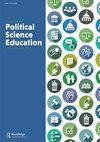人工智能教学:未来二十年
IF 0.6
Q3 POLITICAL SCIENCE
引用次数: 0
摘要
摘要人工智能的出现和对学术诚信的关注,已经让各个学科的教师注意到我们布置的课程类型。但这也是一个时刻,以更清晰、更有活力的方式提供内容,使用更积极的学习形式,提高学生的学术和专业成果。本文调查了期刊中最常见的主题和方法,并就人工智能和生成技术如何增强我们的教学,让教师专注于更高水平的学习成果提供了一些建议。感谢Michael Vale、Colleen Butler-Sweet、Jeff Naftzinger、Alex D’adamo、Elizabeth Luoma和Kate Cunningham一路上的反馈和支持。披露声明没有竞争利益需要申报。作者简介:steven Michels是康涅狄格州费尔菲尔德圣心大学的政治学教授,在那里他教授民主、政治经济学和法律政治学。在他的众多书籍、文章和章节中,有《辛克莱·刘易斯与美国民主》。在LinkedIn上找到他:linkedin.com/in/stevenmichels。本文章由计算机程序翻译,如有差异,请以英文原文为准。
Teaching (with) Artificial Intelligence: The Next Twenty Years
AbstractThe advent of artificial intelligence and concerns over academic integrity have put instructors from every discipline on notice regarding the kinds of coursework we are assigning. But this is also a moment to deliver content in a manner that is clearer and more dynamic, use more active forms of learning, and improve the academic and professional outcomes of our students. This article surveys the most common themes and approaches from the pages of the journal and offers some suggestions for how AI and generative technologies can augment our teaching and allow instructors to focus on higher-level learning outcomes.Keywords: Artificial intelligenceAIChatGPTacademic integritywriting instruction AcknowledgmentsHe would like to thank Michael Vale, Colleen Butler-Sweet, Jeff Naftzinger, Alex D’Adamo, Elizabeth Luoma, and Kate Cunningham for their feedback and support along the way.Disclosure statementThere are no competing interests to declare.Additional informationNotes on contributorsSteven MichelsSteven Michels is a professor of political science at Sacred Heart University in Fairfield, CT, where he teaches courses on democracy, political economy, and the politics of law. Among his many books, articles, and chapters is Sinclair Lewis and American Democracy. Find him on LinkedIn: linkedin.com/in/stevenmichels.
求助全文
通过发布文献求助,成功后即可免费获取论文全文。
去求助
来源期刊

Journal of Political Science Education
POLITICAL SCIENCE-
CiteScore
1.80
自引率
36.40%
发文量
69
期刊介绍:
The Journal of Political Science Education is an intellectually rigorous, path-breaking, agenda-setting journal that publishes the highest quality scholarship on teaching and pedagogical issues in political science. The journal aims to represent the full range of questions, issues and approaches regarding political science education, including teaching-related issues, methods and techniques, learning/teaching activities and devices, educational assessment in political science, graduate education, and curriculum development. In particular, the journal''s Editors welcome studies that reflect the scholarship of teaching and learning, or works that would be informative and/or of practical use to the readers of the Journal of Political Science Education , and address topics in an empirical way, making use of the techniques that political scientists use in their own substantive research.
 求助内容:
求助内容: 应助结果提醒方式:
应助结果提醒方式:


